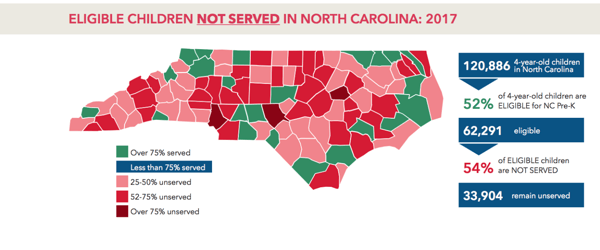
If you’ve been following the news lately, a lot is going on in North Carolina for young children and families! Leaders across the state—from businesses to state government to county municipalities—are leveraging partnerships that use research-based assessment and professional development models (like CLASS) to guarantee more of the state’s youngest residents have access to the high quality care they need and deserve.
Over the years, North Carolina has documented the lasting strength of their state’s Pre-K program throughout elementary school, including:
- higher reading and math scores
- fewer grade retentions
- reduced special education placements
According to recent research out of Duke, the effects of high quality care early in life don’t fade after elementary school. In fact, based on one million children they have followed since 1988, their research shows that stronger outcomes last through at least 8th grade. Their data also shows that African American and low-income children benefit most from high quality experiences early in life.
So, we know high quality care matters. For school, for life, and especially for more vulnerable populations. Unfortunately, even in a state like North Carolina that has long been a leader for young children, a major barrier still exists: access to high quality teaching and learning for the youngest learners.
Very few children have access to high quality teachers in Pre-K or beyond. On top of that, only 47% of eligible children across NC are currently enrolled in high quality Pre-K programs; even when additional funds were available to increase those numbers. Business and early care leaders across the state are looking very carefully at recommendations provided by researchers at Rutgers National Institute for Early Education Research (NIEER). They want to make sure programs are able to offer more 4 year olds the chance to be enrolled in a high quality setting.
 Image source: Barriers to Expansion of NC Pre-K: Problems and Potential Solutions
Image source: Barriers to Expansion of NC Pre-K: Problems and Potential Solutions
All of this matters to our CLASS-y partners in North Carolina, like Mecklenburg and Forsyth Counties, where they are working strategically to ensure more children benefit from outstanding teachers.
In Mecklenburg County, Smart Start, local child care centers, universal public Pre-K (MECK Pre-K), advocacy organizations, and county commissioners are working together on a large plan to expand access to high quality early education for all children birth to age 5. At the core of the plan is CLASS. They are ensuring reliable and valid observational scores are available for coaches to work with teachers in strengthening teacher-child interactions. According to Tameika Leslie, Project Manager for Early Childhood Education (ECE) Initiatives in Mecklenburg County:
County officials believe CLASS benefits both teachers and students. Using CLASS helps ensure teachers receive relevant professional development techniques and participating children start school ready to succeed.
You can learn more about Mecklenburg’s efforts at their InterAct CLASS Summit session in Nashville in April!
Further north in Forsyth County, over 50% of eligible children are not enrolled in NC Pre-K programs. Organizations, such as Smart Start of Forsyth County, are collaborating to ensure that new child care slots aren’t simply places to “put” children, but that these early childhood classrooms offer children the rich teacher-child interactions we know they need to thrive. Several programs in Forsyth County are using Teachstone’s validated 1:1, strength- and video-based coaching model, MyTeachingPartner. Congrats to these Forsyth educators highlighted in this video created by UNC-TV below who share their experiences with MTP CLASS 1:1 Video Coaching!
Our goals at Teachstone are well aligned with the efforts going on in North Carolina: make sure all children have access to the best possible early educational experiences. We can’t wait to follow their progress, and to learn from all of you about what works to reach these critically important goals together.
